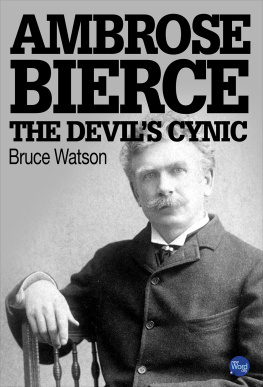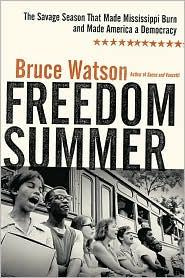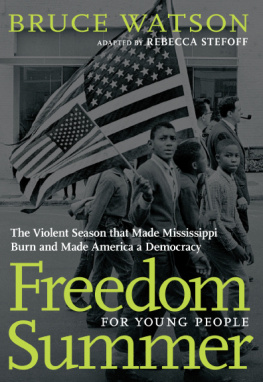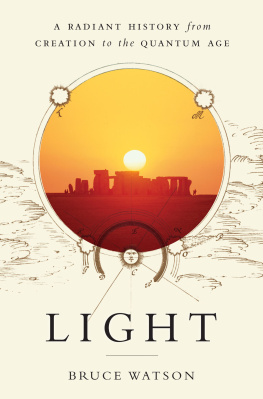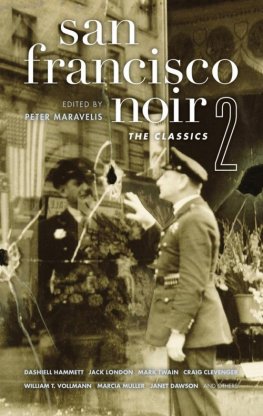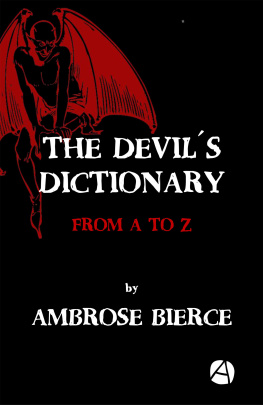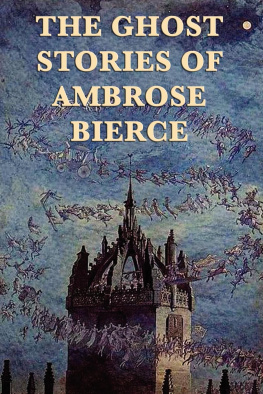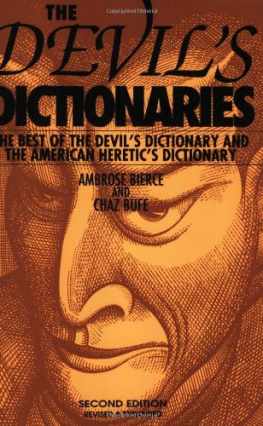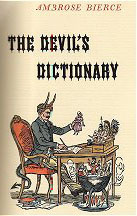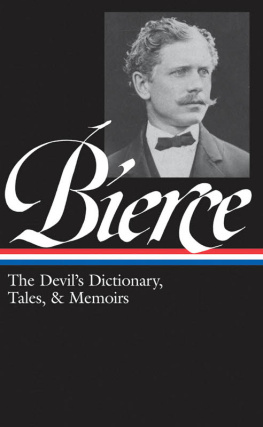Bruce Watson - Ambrose Bierce. The Devil’s Cynic
Here you can read online Bruce Watson - Ambrose Bierce. The Devil’s Cynic full text of the book (entire story) in english for free. Download pdf and epub, get meaning, cover and reviews about this ebook. year: 2014, publisher: New Word City, genre: Detective and thriller. Description of the work, (preface) as well as reviews are available. Best literature library LitArk.com created for fans of good reading and offers a wide selection of genres:
Romance novel
Science fiction
Adventure
Detective
Science
History
Home and family
Prose
Art
Politics
Computer
Non-fiction
Religion
Business
Children
Humor
Choose a favorite category and find really read worthwhile books. Enjoy immersion in the world of imagination, feel the emotions of the characters or learn something new for yourself, make an fascinating discovery.
- Book:Ambrose Bierce. The Devil’s Cynic
- Author:
- Publisher:New Word City
- Genre:
- Year:2014
- Rating:3 / 5
- Favourites:Add to favourites
- Your mark:
- 60
- 1
- 2
- 3
- 4
- 5
Ambrose Bierce. The Devil’s Cynic: summary, description and annotation
We offer to read an annotation, description, summary or preface (depends on what the author of the book "Ambrose Bierce. The Devil’s Cynic" wrote himself). If you haven't found the necessary information about the book — write in the comments, we will try to find it.
Once derided as a hopeless cynic, American author Ambrose Bierce now enjoys a solid literary reputation. Witty and sardonic, Bierce speaks to our own scandal-ridden times. His savage Civil War stories have become classics and his Devils Dictionary is often quoted. In this brief biography, Bruce Watson explores the sorrow behind the wit, and probes Bierces mysterious disappearance a century ago.
Ambrose Bierce. The Devil’s Cynic — read online for free the complete book (whole text) full work
Below is the text of the book, divided by pages. System saving the place of the last page read, allows you to conveniently read the book "Ambrose Bierce. The Devil’s Cynic" online for free, without having to search again every time where you left off. Put a bookmark, and you can go to the page where you finished reading at any time.
Font size:
Interval:
Bookmark:
There are writers who lead lives of quiet exaltation, passing time simply, penning their adventures. And there are other writers, less imaginative or less acclaimed, who must become their own protagonists searching for a part in some bold, personal saga. It was in this latter spirit, nearly a century ago, that Ambrose Bierce - journalist, author, cynic nonpareil - began the last chapter of his life in revolutionary Mexico .
There is a good deal of fighting going on over on the Mexican side of the Rio Grande, he wrote from Laredo, Texas, in 1913. But I hold to my intention to go into Mexico if I can. In the character of innocent bystander I ought to be fairly safe.
He was 71 at the time, silver-haired, impeccably groomed, still ramrod straight. Though plagued by asthma, his iron will had kept him strong and fiercely defiant. Twenty years earlier he had been the countrys most acerbic critic. A swipe of his pen had squandered reputations, brought death threats, infuriated politicians. But facing the Mexican border he was alone, writing one of the great death scenes in American lore - his own.
If you hear of my being stood up against a Mexican stone wall and shot to rags, please know that I think that a pretty good way to depart this life. It beats old age, disease, or falling down the cellar stairs. To be a Gringo in Mexico - ah, that is euthanasia.
And so Bitter Bierce saddled his horse and rode into the territory of Pancho Villa . A few letters later, he passed into rumor. He was never heard from again. No remains, no personal belongings, have ever been found.
Though he is now widely respected as one of the great nineteenth century American authors, to readers of the Gilded Age Ambrose Bierce was either devil or prophet. Columnist, critic, and author of some of the best war stories ever written, he cast a scathing eye on humanity. His career spanned an era of frantic industrialization from post-Civil War to pre-World War I, and his character - restless, brash, and opinionated - embodied the times he lived in. Yet he fought the emerging society to the end, never bowing to popular optimism, never softening his attacks on preachers, politicians, and that immortal ass, the average man. He was the master of invective, a curmudgeon for all seasons. No pen was ever sharper, none more bitter. To wit:
Politics, n. A strife of interests masquerading as a contest of principles. The conduct of public affairs for private advantage.
Love, n. A temporary insanity curable by marriage.
Alone, adj. In bad company...
But if brevity is the soul of wit, then sorrow is its heart. Beneath Bierces crusty shell lay the profound sadness of an impossible ideal betrayed. Unable to endure the human race, he repeatedly fled family and friends in search of a tolerable existence. By the time he vanished in Mexico in 1913, he had fought in the Civil War , crossed the plains on horseback, prospected for gold, and carved a channel of protest through an America whose destiny he saw as anything but manifest. The mystery of Ambrose Bierce lies not only in his disappearance but also in his sources - the source of his wit, his anger, and his cruel appraisal of the world.
Birth, n. The first and direst of all disasters.
He was born Ambrose Gwinett Bierce, the tenth child of a struggling Ohio farmer tilling what, in 1842, was the Western Reserve . He hated the name Ambrose, a name fit only for the mouths of women in which it sounds fairly well. Throughout his life he was called simply Bierce. Not much is known of his childhood. Critics have found only his parents staunch Calvinism as a source of his vitriol. Laura and Marcus Aurelius Bierce made daily prayer and Bible reading a fixture in their hardscrabble lives, instilling in Ambrose a lifelong hatred of organized religion and yet an unflinching Puritanism . Toward the end of his life, Bierce boasted that no woman had ever seen him naked. He was a Victorian gentleman in an age that shuddered at intimacy and found other worlds to conquer.
He later regarded his parents as unwashed savages, but his father, while a poor farmer who could give me no general education... had a good library, and to his books I owe all that I have. By the age of 10, Bierce had read Homer . Though he would heap abuse on his contemporaries, including Mark Twain , Walt Whitman , and Henry James , he maintained a deep reverence for the classics.
Bierce left home at 15, worked odd jobs, put in a year at a military academy until, at almost 19, the Civil War offered him escape from small-town life. Seven days after the firing on Fort Sumter he enlisted, and within six weeks he saw action on the Virginia border. Later, he fought at Shiloh and Chickamauga , the latter the title of one of his most famous stories about the folly of war. With his military training and keen intelligence, Bierce became a topographical engineer. He scouted enemy territory, mapped offensives, rose to the rank of lieutenant, and was later brevetted as a major. But in the Battle of Kennesaw Mountain , a bullet shattered his temple, and he was shipped to a hospital on a flatcar, riding with hundreds of groaning soldiers through a driving rain. He suffered dizzy spells and blackouts for months but returned to fight again. After the injury, however, Bierces family found him a different man. Some of the iron of that shell seemed to stick in his brain, his brother Albert said, and he became bitter and suspicious, especially of his close friends.
In essays and in fiction, Bierce would return to the Civil War again and again. His stories, among the harshest indictments of war in American literature, contain no heroes. Bierces soldiers rarely die in battle. Instead they are pinned beneath falling buildings, trapped behind enemy lines, executed by rope or by accident with no more glory or pity than is offered by the elements. The Civil War fascinated and appalled Bierce; he found in it a metaphor for his dark vision, and he bore the scars of its savagery for the rest of his life. Shortly before Appomattox , Bierce became a government confiscator of enemy property in Selma, Alabama. Watching carpetbaggers in action and getting shot at by local snipers, he hardened for another year before going West on a survey expedition.
San Francisco in the 1860s was home to a ragtag collection of drifters and dreamers. From 49ers who had struck it poor to the lucky few tossing silver dollars into the streets, the city was home to a wealth of characters Bierce would have had to invent if they had not already been his neighbors. Street shootings were common, as were beatings of the Chinese. Gamblers, sailors, grandstanding politicians, millionaires in red-flannel undershirts, all gave San Francisco a flavor that would amuse and appall Bierce his entire life.
A boomtown of more than 60,000, San Francisco had six newspapers and a lot of local talent. Mark Twain was writing for the Morning Call. Bret Harte , beginning to publish his stories of the mining camps, was a secretary in the U.S. Mint, where Bierce worked briefly as night watchman. Sierra poet Joaquin Miller was already contributing to journals. Bierce began doing the same and soon broke into print with verses and commentary. By 1868 he was editor of the News-Letter and its Town Crier columnist. From the beginning he served notice that he would spare no one. Somebody has attempted to rob the safe in the office of the City and County Treasurer, the Town Crier wrote. This is rushing matters; the impatient scoundrel ought to try his hand at being a Supervisor first. From Supervisor to Thief the transition is natural and easy. In another column: An insurance company was robbed. Tit for tat. Commenting on the murder of a Chinese woman, he wrote, she died of galloping Christianity of the malignant California type.
Such irreverence drew quick notice, even from the opposite coast.
Next pageFont size:
Interval:
Bookmark:
Similar books «Ambrose Bierce. The Devil’s Cynic»
Look at similar books to Ambrose Bierce. The Devil’s Cynic. We have selected literature similar in name and meaning in the hope of providing readers with more options to find new, interesting, not yet read works.
Discussion, reviews of the book Ambrose Bierce. The Devil’s Cynic and just readers' own opinions. Leave your comments, write what you think about the work, its meaning or the main characters. Specify what exactly you liked and what you didn't like, and why you think so.

